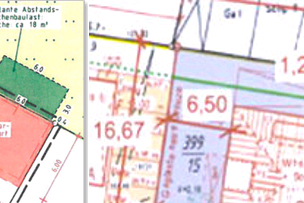Registering and deleting building encumbrances
A building obligation is an obligation under public law to do, refrain from doing or tolerate certain things on one's own property - usually in favor of the project on another, neighboring property.
Particularly in a densely built-up city like Wiesbaden, it is not always possible for prospective builders to meet the legal requirements for a building project on their own property - for example, when it comes to creating the necessary supply and disposal lines, parking spaces, access, passage to their own property or compliance with the distance zones. By registering a so-called building obligation on another - usually neighboring - property, the eligibility for approval of a certain construction project can nevertheless be established.
A building charge is an obligation under public law that an owner (or also the hereditary building or usufructuary) of a property enters into vis-à-vis the building inspectorate in favor of the building project of a third party - usually a neighbor. By registering a building obligation, the owner of the encumbered property permanently assumes the obligation to do, tolerate or refrain from doing certain things.
For a building charge to become effective, it must be entered in the so-called register of building charges.
FAQs - Here you will find answers to the most frequently asked questions on the subject of building encumbrances
What is a building charge?
When and why are building encumbrances required?
What can building encumbrances be registered for?
Who can register a building charge?
How is a building charge applied for?
What documents are required?
When does a building charge take effect?
What does the entry of a building charge cost?
Is there any financial compensation for the owner of the land on which the building charge is registered?
How long is a building lease valid?
Can a building charge be deleted again?
What is the difference between a building charge and an easement?
Baulasten
Address
65189 Wiesbaden
